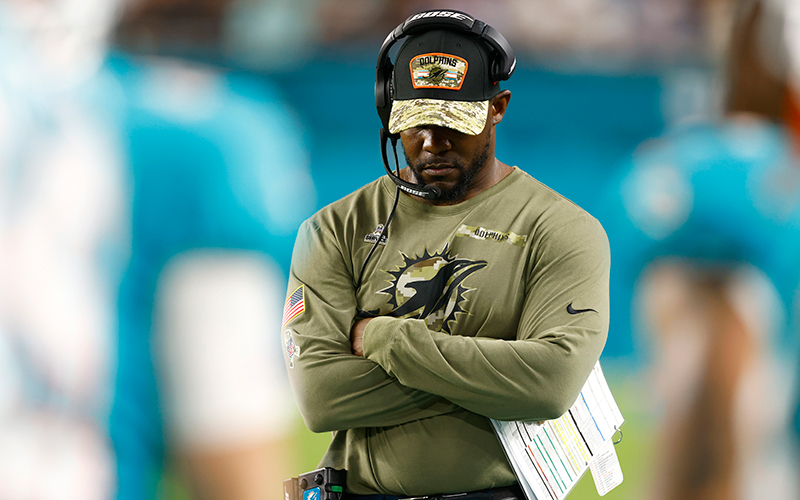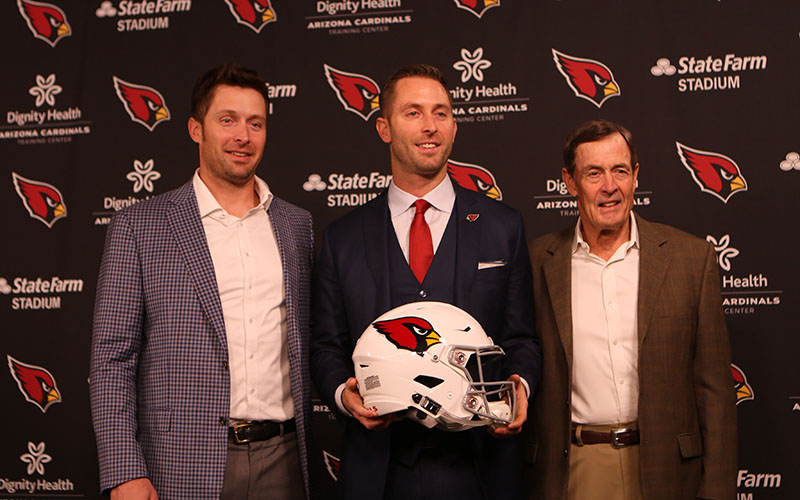
Former Miami Dolphins coach Brian Flores has filed a lawsuit that claims the NFL discriminated against him and other Black coaches in their hiring practices. The Arizona Cardinals were mentioned in the suit. (Photo by Michael Reaves/Getty Images)
PHOENIX — Brian Flores, the recently fired coach of the Miami Dolphins, implicated the Arizona Cardinals in the league-wide pattern of racism and discrimination alleged in his class action lawsuit against the NFL, the Denver Broncos, the New York Giants and the Dolphins.
In the 58-page document, filed Tuesday, Flores noted the short coaching tenure with the Cardinals of Steve Wilks, who is Black. Wilks guided the 2018 Cardinals to a 3-13 record, after which he was fired and replaced by Kliff Kingsbury. Flores offered a different take on what seemed at the time to outsiders, a routine firing after a bad season.
Flores pointed out that the Cardinals team Wilks inherited had problems unrelated to coaching. They included a rookie quarterback, a spate of injuries and a DUI in training camp by the general manager, Steve Keim, who served a five-week suspension at the start of the season.
In search of an offensive identity, the Cardinals traded up five spots and relinquished two draft picks in the 2018 draft to take UCLA quarterback Josh Rosen at No. 10 overall. But the offense would finish last in the NFL in yards and points as Rosen struggled with his consistency, the star running back David Johnson struggled with injuries and the team’s dependable receiver Larry Fitzgerald, then in his 15th season, struggled with the inevitable wear and tear of time.
The defense showed more signs of life than the offense but still did not seem to benefit as much as expected from having a defensive-minded coach like Wilks at the program’s helm. Led by Chandler Jones, Patrick Peterson, and a young Budda Baker, it ranked 26th out of 32 teams in points allowed and 20th in yards allowed.
As Flores stated in the lawsuit, “Mr. Keim, a white GM, kept his job, but Mr. Wilks was fired.” After the Cardinals, Wilks would spend a year with the Cleveland Browns as their defensive coordinator, and now is the defensive coordinator at the University of Missouri.
Kingsbury inherited the first overall pick – the Cardinals’ reward for finishing with the league’s worst record – which was used to draft Kyler Murray. In Kingsbury’s first year, the Cardinals finished 5-11, after which, as Flores noted, Kingsbury “retained his job and was given time to improve.”
“Deeper in the suit, that’s what he was saying about how white coaches are typically given a longer runway than black coaches,” said William Rhoden, an award-winning journalist for The Undefeated who has written extensively on race and sports. “And then they are more quickly given second chances after a failed first attempt. So yeah, the fact that Kliff Kingsbury is on thin ice and shaky, and people talked about it, but he is given a couple seasons and finally turns it around, where Wilks was never given that chance.
“It is kind of like the ‘step child syndrome,’ where you get this step child, where you know you don’t really, and you’re always looking for an excuse to punish them. I think in many ways black coaches and executives in the NFL have sort of been like step-children, foster children, people never really accepted as part of the family, but inherited and take reluctantly.”

The treatment of former coach Steve Wilks by the Arizona Cardinals was mentioned in a lawsuit filed by former Miami Dolphins coach Brian Flores. (File photo by Omar Soussi/Cronkite News)
Before Flores cast a negative light on the Cardinals’ hiring practices, the franchise was known as one of the first to hire a Black general manager. They promoted Rod Graves in 2002, the same year that the Baltimore Ravens promoted Ozzie Newsome to the same position.
In a statement released Wednesday to ProFootballTalk, Graves said, “Brian Flores’ lawsuit is just the latest, dramatic call to action for the NFL and its team owners. Men and women of color in the NFL community have long known that the odds of advancing in the coaching ranks and in the front office are stacked against them.”
Graves is the executive director of the Fritz Pollard Foundation, an organization focused on championing diversity in the NFL.
ASU football coach Herm Edwards, was unavailable for comment, recently told Cronkite News “that the NFL needs to do better, not only as coaches, but in positions of authority, people that get to make the decisions.” Edwards coached the New York Jets and Kansas City Chiefs.
The lawsuit was filed on Feb. 1, the first day of Black History month, which added weight to Flores’ accusations. His attorney released a slew of Twitter messages regarding the lawsuit, even tweeting out the physical copy of the document so it could be digested by all.
The suit went into great detail – offering up names of teams and coaches – about how Black coaches in the NFL are treated during the hiring process and after they have a head job. Flores explained his experiences interviewing for head-coaching jobs with the Giants, Broncos and Dolphins and gave in-depth examples of how other coaches were treated the same way. As Flores pointed out, the teams with whom he interviewed displayed clear disrespect for the Rooney Rule, which was instituted by the NFL in 2003 and requires teams to interview at least one Black candidate for any front office position.
In the case of the Broncos, Flores stated that John Elway, the Broncos general manager, and other hiring personnel showed up to Flores’ coaching interview an hour late. “They looked completely disheveled, and it was obvious that they had [been] drinking heavily the night before,” the lawsuit said.
The Broncos would eventually hire Vic Fangio, who is white, for the position.
In the case of the Giants, Flores received text messages from the New England Patriots’ coach, Bill Belichick, congratulating him on a job that Flores hadn’t even interviewed for yet. Flores then asked, “Coach, are you talking to Brian Flores or Brian Daboll. Just making sure.” Belichick then apologized to Flores for sending him a text meant for the former Buffalo Bills offensive coordinator, now Giants head coach, Brian Daboll. Flores used this text string as further proof of the NFL’s flawed hiring practices.
Since the lawsuit was filed, other coaches, including former Cincinnati Bengals coach Marvin Lewis, have stepped forward, agreeing with Flores’ story.
Within two hours of the lawsuit’s filing, the NFL released a statement defending its practices. “The NFL and our clubs are deeply committed to ensuring equitable employment practices and continue to make progress in providing equitable opportunities throughout our organizations,” said the statement, which added, “We will defend against these claims, which are without merit.”

